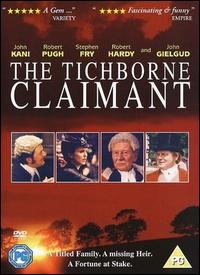This article needs additional citations for verification .(June 2019) |
| The Tichborne Claimant | |
|---|---|
 | |
| Directed by | David Yates |
| Screenplay by | Joe Fisher |
| Produced by | Tom McCabe |
| Starring | |
| Cinematography | Peter Thwaites |
| Edited by | Jamie Trevill |
| Music by | Nicholas Hooper |
Production companies |
|
| Distributed by | Redbus Film Distribution |
Release date |
|
Running time | 98 minutes |
| Country | United Kingdom |
| Language | English |
The Tichborne Claimant is a 1998 British drama film directed by David Yates from a screenplay by Joe Fisher. The film stars John Kani, Robert Pugh, Stephen Fry, Robert Hardy and John Gielgud. It is based on the Tichborne case, a historical case of identity theft.
Contents
In 1854, Roger Tichborne, then-heir to the Tichborne Baronetcy, disappeared while traveling in South America. He was thought likely to have set sail with the ship Bella, which was shipwrecked off the coast of the Empire of Brazil, with no known survivors. In 1865, Thomas Castro, an Australian butcher, started claiming to be the missing heir. The dispute over his identity lasted to his death in 1898. While Castro is currently considered an impostor, doubts considering his real identity have persisted to the present.